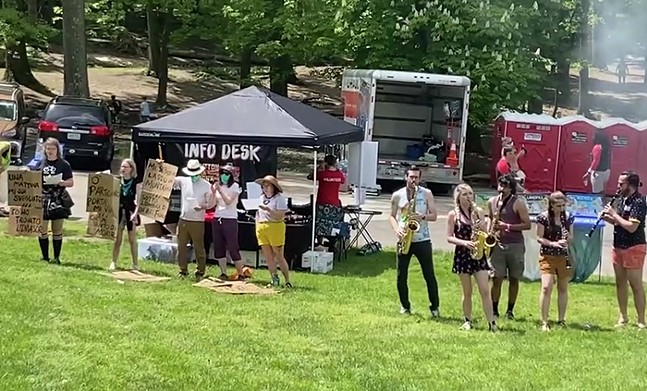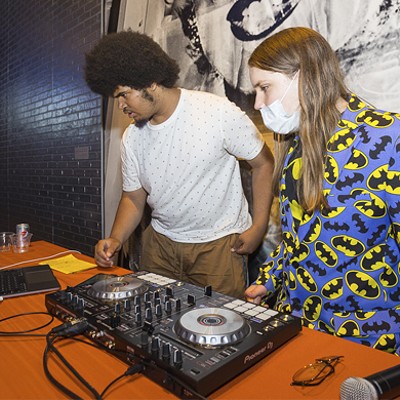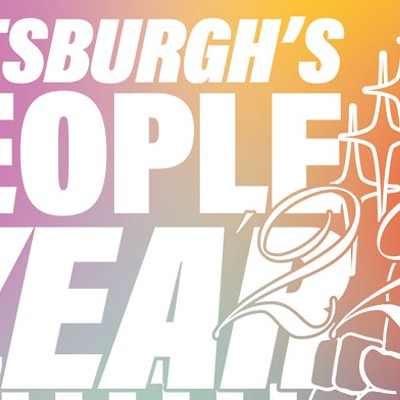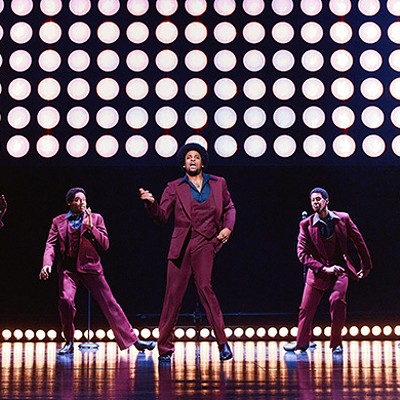
“People at a protest would benefit from being together in rhythm and harmony. However, people are embarrassed to sing because they are not good enough,” says Edwin Everhart, the director of the Pittsburgh Labor Choir and a member of the May Day Marching Band.
The Pittsburgh Labor Choir, which performs at demonstrations and events across the city, aims to promote more music at events in an attempt to get protesters to work as a unit.
This past weekend, the Labor Choir performed with The May Day Marching band at the 2022 Pittonkatonk, an annual music festival that showcases local bands and musicians from all over the world in Schenley Park.
“Music is a universal language. Music can keep people going and together,” says Pete Spynda, creator of Pittonkatonk.
The Labor Choir first launched in February 2020 as a means to “share protest music of labor and anti-fascist movements,” according to their Facebook page. They say they’re open to all ages and all levels of musical skill and experience, and their songs include both old and new music from around the world.
During the music fest, they performed multiple songs with the May Day Marching Band, holding up song lyrics for the crowd to follow along with like “Bella ciao” (“Beautiful goodbye”), an Italian protest song.
“Singing was a normal thing at one point. People were able to sing even if their voice was not a ‘good’ singing voice. In today’s world, not having the best of voices is a shameful thing,” says Sarah Axtell, member of the Pittsburgh Labor Choir. “We want people to be able to find the fun in singing again.”
Axtel says the group includes songs from different cultures and some written in different languages than spoken by most of the choir to “increase awareness and skill.”
Choir members say adding music can help demonstrators get into a rhythm, which in turn can help the energy of a protest.
“I think music uplifts people’s spirits, I think it keeps them going especially when the protest can go hours at a time,” says Spynda.
But Everhart recommends finding the right music to match the vibe of the event. “Many people struggle to find the right song that everybody could learn while singing,” he says. “Songs that have lyrics that can be easily replaced or has a chorus.”
Taylor Berg, another member of the Labor Choir, agrees. “A good chant that can turn into a song is a good place to start as well. Everyone may not know a song, but everyone can quickly pick up a chant,” Berg says.
In addition to performing older songs, The Pittsburgh Labor Choir also teaches people how to write their own protest anthems.
“We are always willing to support people any way we can. We are willing to get the music at a protest going,” Everhart says. “We do not take over a protest, we just amplify the sounds and messages that relate to them.”
The Pittsburgh Labor Choir tries to attend every protest they can around Pittsburgh, but even if they’re not at a demonstration, they say that does not mean the music should stop.
Everhart recommends protesters bring the music with them.
“Bring a drum or guitar to a protest, even if you cannot play it. People will ask you if you are going to sing something for them,” Everhart says. “That is when you say, 'Actually, I was hoping that we can sing together,' and that’s when the fun begins.”
















